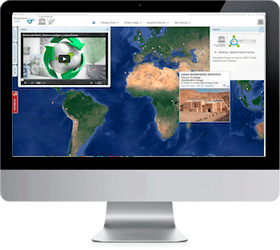Sequoia-Kings Canyon biosphere reserve. In 2009, the Sequoia Natural History Association (SNHA) and the National Park Service joined forces to begin the installation of a solar power generation system at Crystal Cave making tours and operations available by power from the sun. With funding provided by a grants
Read more →Blaenavon Industrial Landscape World Heritage Site. Wales’ national coal mining museum is looking to a clean future with its solar panel installation, which will help to preserve the country’s past. The area around the Blaenavon ironworks provides an extraordinarily comprehensive picture of the South Wales coal and iron
Read more →Clean cookstoves to help protect forests of Virunga National Park (World Heritage Site). Virunga National Park is located at the heart of the conflict, and straddles the border between the DRC, Rwanda and Uganda. Home to some of the world’s last remaining Mountain Gorillas, it is Africa’s first
Read more →Developing a renewable energy economy model for the Cape West Coast Biosphere Reserve. Key objectives: Promotion of sustainable practices that will see a shift toward a renewable energy economy and “greening of the biosphere”. Overview South Africa’s Cape West Coast Biosphere Reserve (CWCBR) is like a small country
Read more →Methanation of horse manure in Biosphere Fontaineblau & Gâtinais The equine industry is a major industry in Seine-et-Marne, which host more than 8,000 horses producing some 72,000 tons of manure. This manure is traditionnally used in mushroom culture, but the recent delocation of these cultures, rose question on
Read more →100% power from renewable energy sources and 100% regional energy supply. With the declaration of the biosphere park the inhabitants of the “Walsertal“ contributed to protect the valley “Grosses Walsertal” by applying sustainable and ecologically compatible development. Thus, the fascinating region ensures a high quality of life
Read more →Floating Bio-digesters for Waste Management and Energy Recovery in Tonle Sap biosphere reserve. The Tonle Sap is the largest freshwater lake in South-east Asia. It is connected to the Mekong River by the Tonle Sap River. The ecological importance of Tonle Sap was recognised in 1997 when
Read more →An active system that would be inserted into an ecosystem. El Pinacate and Gran Desierto de Altar Biosphere Reserve is characterized by its uncommon scenic beauty and enormous biodiversity. It hosts 553 species of plants, 46 of mammalians, 237 species of birds, 45 of reptiles and 4
Read more →Honours project in environmental sustainability. Purpose of the Project To establish the economic, environmental, social and cultural benefits of alternative energy sources in the Frontenac Arch Biosphere in order to assess the financial and yield feasibility of alternative energy development. The Frontenac Arch Biosphere’s board of directors
Read more →El Hierro biosphere reserve, RE island strategy. The island of El Hierro, with a population of 12,000 inhabitants, will become by the end of 2013 the first island territory in the world able to power itself entirely from renewable energy sources. For the first time the traditional
Read more →














